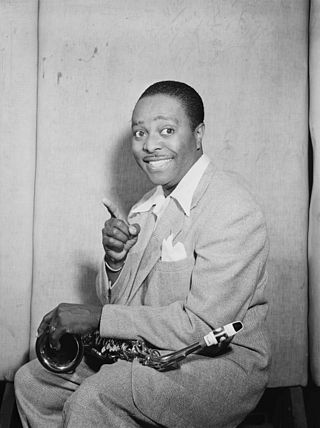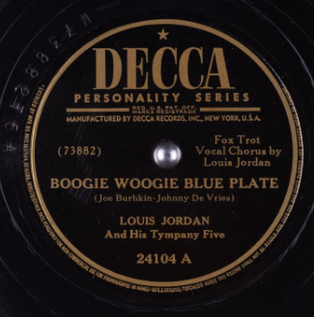
Louis Thomas Jordan was an American saxophonist, multi-instrumentalist, songwriter and bandleader who was popular from the late 1930s to the early 1950s. Known as "the King of the Jukebox", he earned his highest profile towards the end of the swing era. He was inducted into the Rock and Roll Hall of Fame as an "early influence" in 1987.

"Caldonia" is a jump blues song, first recorded in 1945 by Louis Jordan and his Tympany Five. Although credited to Fleecie Moore, his wife at the time, Jordan is the actual songwriter. The song was a hit for Jordan as well as several other musicians.
"Let the Good Times Roll" is a jump blues song recorded in 1946 by Louis Jordan and his Tympany Five. A mid-tempo twelve-bar blues, the song became a blues standard and one of Jordan's best-known songs.

"Ration Blues" is a song written by Louis Jordan, Antonio Cosey, and Collenane Clark. It was performed by Louis Jordan and his Tympany Five, recorded in October 1943, and released on the Decca label. The "B" side of the record was "Deacon Jones".
"Buzz Me" is a 1946 song by Louis Jordan and his Tympany Five that is credited to Fleecie Moore and Danny Baxter. Released by Decca Records as a single, it was the first song in 1946 to reach the number one spot on the R&B chart and was the first of five Louis Jordan releases to achieve the top position in 1946. "Buzz Me" also peaked at number nine on the pop chart. The single became a double-sided hit when the B-side "Don't Worry 'Bout That Mule" also hit number one on the R&B chart later in the year.

"Don't Worry 'Bout That Mule" is a song attributed to Charles Stewart, William Davis, Duke Groaner, and Fleecie Moore. It was performed by Louis Jordan and his Tympany Five, recorded in July 1945, and released on the Decca label.

"Texas and Pacific" is a song written by Jack Wolf Fine and Joseph E. Hirsch. It was performed by Louis Jordan and his Tympany Five, recorded in October 1946, and released on the Decca label. The song describes a rider's experience on the Texas & Pacific Railway. The "B" side of the record was "I Like 'Em Fat Like That".

"Boogie Woogie Blue Plate" is a song written by Joe Burhkin and Johnny DeVries. It was performed by Louis Jordan and his Tympany Five and released on the Decca label.

"Early in the Mornin'" or "'Early in the Morning" is a song that was recorded by Louis Jordan and His Tympany Five in 1947. It is an early example of a blues which incorporates Afro-Cuban rhythms and percussive instruments. "Early in the Mornin'" became a hit, reaching number three in Billboard magazine's race records chart.
"We Gonna Move to the Outskirts of Town" is a song originally recorded on September 3, 1936, by Piedmont blues musician Casey Bill Weldon. Weldon performed it as a solo piece, with vocals and acoustic guitar plus piano and double bass accompaniment.

"What's the Use of Getting Sober (When You Gonna Get Drunk Again)" is a song written by Busby Meyers, performed by Louis Jordan and his Tympany Five, recorded in July 1942, and released on the Decca label (catalog no. 8645). The "B" side of the record was "The Chicks I Pick Are Slender and Tender and Tall".

"Run Joe" is a calypso song written by Joe Willoughby, Louis Jordan, and Walt Merrick. It was performed by Louis Jordan and his Tympany Five with vocal chorus by The Calypso Boys. It was recorded in April 1947 and released on the Decca label. The "B" side of the record was "All for the Love of Lil".
Billboard Most-Played Race Records of 1947 is a year-end chart compiled by Billboard magazine ranking the year's top race records based on the number of times the record was played on the nation's juke boxes.Billboard assigned point totals to each record based on its juke box plays.
Billboard Most-Played Race Records of 1946 is a year-end chart compiled by Billboard magazine ranking the year's top race records based on the number of times the record was played on the nation's juke boxes.Billboard assigned point totals to each record based on its juke box plays.

"Salt Pork, West Virginia" is a song attributed to Fleecie Moore and William J. Tennyson Jr., performed by Louis Jordan and his Tympany Five, and released on the Decca label. It peaked at No. 2 on Billboard's race record chart and remained on the chart for 15 weeks. It ranked No. 8 on the magazine's list of the most played race records of 1946.

"Beware" is a song attributed to Morry Lasco, Dick Adams, and Fleecie Moore. It was performed by Louis Jordan and his Tympany Five, recorded in January 1946, and released on the Decca label.

"That Chick's Too Young to Fry" is a song written by Tommy Edwards and Jimmy Hilliard. It was performed by Louis Jordan and his Tympany Five, recorded in January 1946, and released on the Decca label. The record's "B" side was "Choo Choo Ch'Boogie".

"Reconversion Blues" is a song attributed to Steve Graham and Fleecie Moore. It was performed by Louis Jordan and his Tympany Five, recorded in October 1946, and released on the Decca label. The record's "B" side was "Salt Pork, West Virginia".

"Don't Burn the Candle at Both Ends" is a song written by Benny Carter, Irving Gordon, and Louis Jordan. It was performed by Louis Jordan and his Tympany Five, recorded in December 1947 and released on the Decca label. The "B" side of the record was "We Can't Agree".

"Five Guys Named Moe" is a song written by Jerry Bresler and Larry Wynn, performed by Louis Jordan and his Tympany Five, recorded in January 1942, and released on the Decca label. The song peaked at No. 3 on Billboard's race record chart and stayed on the chart for 10 weeks.















